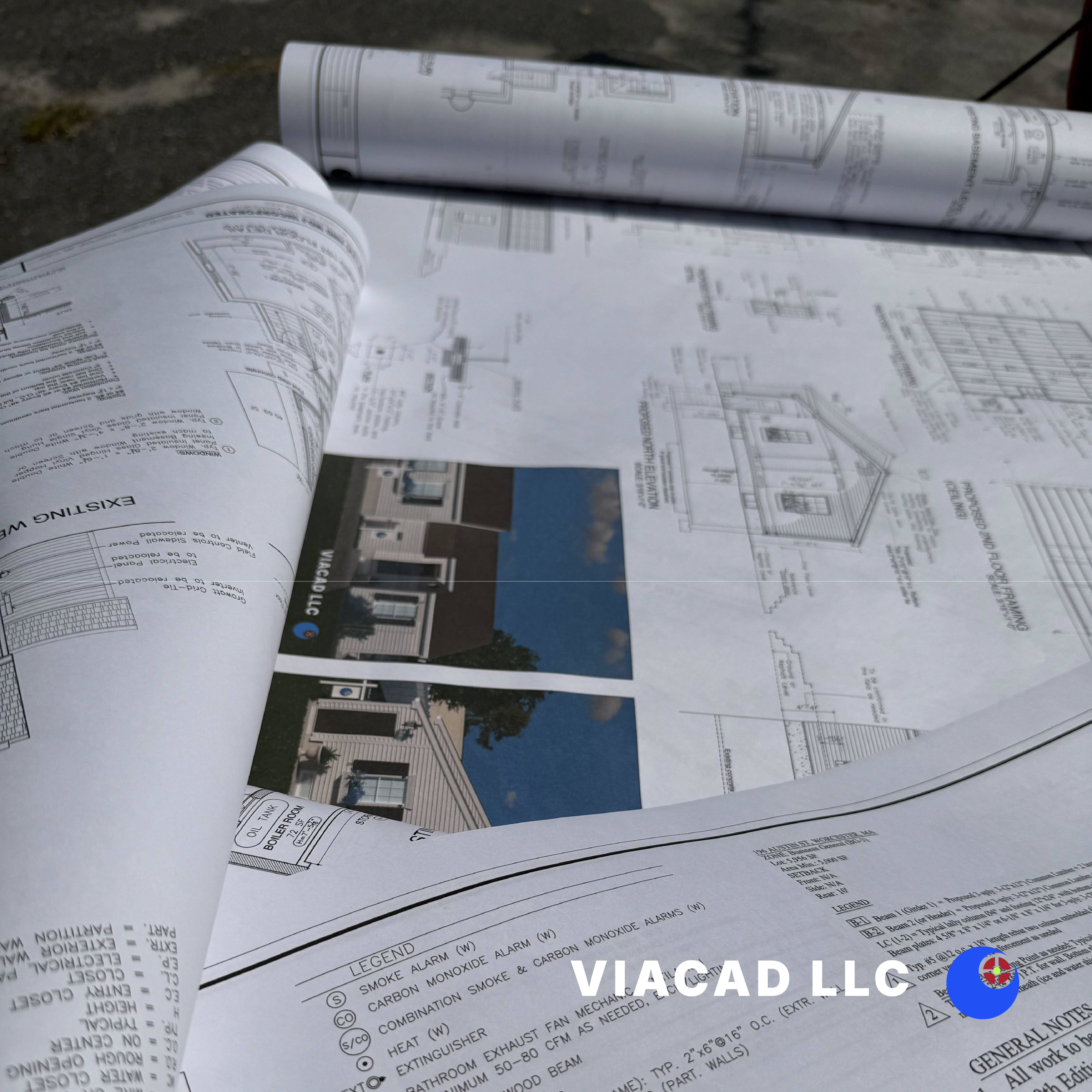
NOTE: VIACAD, LLC specializes in developing and producing detailed building plans (construction blueprints) for both residential and commercial projects across Massachusetts with more than 18 years of experience in design & construction producing professional permit-ready drawings for homeowners, builders, developers, and businesses.
Insulating a basement in Massachusetts is a crucial step for homeowners aiming to improve energy efficiency, prevent moisture problems, and create a comfortable living space. Proper basement insulation is especially important during the cold winter months in Massachusetts, as it helps maintain warmth and reduce heating costs. Understanding how to insulate a basement properly involves addressing foundation walls, moisture buildup, air leaks, and choosing the right materials and methods. This guide will walk you through the essential steps and considerations for insulating your basement walls effectively.
NOTE: Information provided here is for educational purposes only.
Basements in Massachusetts face unique challenges due to the region’s climate, which includes cold winters and humid conditions. These factors contribute to issues such as heat loss, moisture buildup, and mold growth, especially when basement walls and floors are not properly insulated or sealed. Concrete walls and foundation walls can allow cold air and moisture to penetrate, leading to condensation and potential damage.
To insulate a basement in Massachusetts successfully, it’s important to address both air leaks and moisture control. Ignoring these can result in mold problems and structural damage over time. Therefore, the insulation process must include sealing gaps, applying vapor barriers, and ensuring proper drainage around the foundation. It is also essential to apply waterproofing products or coatings to basement walls and floors to further protect against moisture intrusion. Additionally, sloping the ground away from the foundation helps prevent water from accumulating near the basement walls. When considering drainage, it’s important to address moisture issues from the outside of the house as well, such as by installing exterior waterproofing or drainage systems.
When insulating basement walls, two main options are foam boards and fiberglass insulation. Foam insulation is often preferred because it provides a continuous barrier against air and moisture, reducing the risk of condensation on the concrete wall. Closed-cell spray foam, in particular, offers excellent insulation and vapor barrier properties, making it ideal for basement applications.
Fiberglass insulation can be used but typically requires a vapor barrier and careful installation to prevent moisture from becoming trapped behind the insulation. Using rigid foam boards against foundation walls is an easy and effective option to insulate and protect the basement from moisture and heat loss. Foam boards are lightweight and easy to cut to fit any basement wall shape, making installation straightforward for DIY projects.
Before installing any insulation, it’s essential to prepare the basement walls properly. This includes inspecting the foundation walls for cracks or any sign of a leak and repairing them to prevent water intrusion. You may need to remove old paint, drywall, or damaged materials before making repairs to ensure a clean surface. Moisture buildup is a common problem in basements, so ensuring that exterior drains and foundation drains are functioning correctly is vital to keep water away from the foundation. Having a properly installed and maintained drain system is crucial for directing water away and preventing seepage.
Sealing air leaks around windows, electrical outlets, and any gaps in the walls is another critical step. Using caulk or expanding foam to seal these gaps helps prevent cold air from entering and warm air from escaping, improving the effectiveness of the insulation.
Applying a vapor barrier directly to the concrete wall or over the insulation is necessary to protect against condensation and mold growth. This barrier should be carefully taped and sealed at every edge and corner to create a continuous shield against moisture.

Once the basement walls are prepared and moisture issues addressed, you can begin the insulation process. Start by cutting foam boards or insulation panels to fit snugly against the foundation wall, then install them carefully to ensure there are no gaps. Use adhesive or mechanical fasteners to secure the insulation in place. You may need to apply adhesive or sealant along the edges to ensure a tight fit and prevent air or moisture infiltration.
For added protection, tape all seams and edges with specialized vapor barrier tape to prevent air and moisture leaks. After insulation is installed, you can proceed with finishing the walls by installing drywall or other wall coverings. Finished walls not only improve the basement’s appearance but also add an extra layer of insulation and protection. Proper insulation can help maximize the usable area of your basement for living or storage.
To further protect your basement and maintain a comfortable environment, consider using a dehumidifier to control indoor humidity levels, especially during the humid summer months. It’s important to insulate all areas of the basement, including walls, floors, and rim joists, to improve energy efficiency and thermal retention. Proper ventilation and sealing of the roof and floor edges also help prevent moisture problems.
Proper insulation can help lower energy bills by improving thermal retention and reducing heating and cooling costs.
When dealing with persistent water leaks or drainage issues, homeowners typically have two options: exterior waterproofing, which involves digging around the foundation and applying sealers or drainage systems, or interior solutions such as waterproof coatings and mold prevention measures. If you encounter these issues, it’s advisable to consult a professional company specializing in basement waterproofing and insulation. They can assess your situation and recommend the best approach to resolve these problems efficiently.
The cost of insulating a basement in Massachusetts varies depending on the size of the space, the type of insulation used, and the extent of moisture control measures needed. The size of your lot and the surrounding landscape can also influence insulation and moisture control costs. While foam insulation and vapor barriers might be more expensive upfront, they offer long-term benefits by reducing heat loss, preventing mold growth, and increasing the overall energy efficiency of your house.
Investing in proper basement insulation not only enhances comfort but also protects your house’s structural integrity and can increase its value. Addressing both insulation and moisture control as means to improve comfort and energy efficiency ensures you create a healthier and more secure living environment.
Knowing how to insulate a basement in Massachusetts involves a comprehensive approach that addresses foundation walls, moisture buildup, air leaks, and the application of appropriate insulation materials. By sealing gaps, applying vapor barriers, and choosing effective insulation like foam boards, homeowners can protect their basements from heat loss and mold growth.
Proper preparation, installation, and finishing ensure that your basement becomes a comfortable, energy-efficient space that stands up to Massachusetts' climate challenges. Whether you plan to finish your basement or simply want to improve your home's insulation, following these guidelines will help you create a durable and healthy basement environment.


Currently accepting projects in Massachusetts.